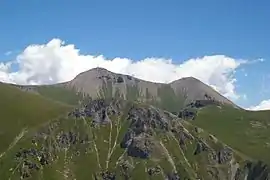Titov Vrv
Titov Vrv (Macedonian: Титов Врв, Albanian: Turk i Madh) is the highest peak in the Šar Mountains at 2,748 m. It is located about 13 mi (21 km) northwest of the North Macedonia's city of Tetovo, near the border with Kosovo.[a] The summit was named after former Yugoslav communist leader Josip Broz Tito. Its original name was Голем Турчин/Golem Turčin ("Big Turk"). In 1934, the peak was renamed Mount Aleksandar after the name of the Yugoslav King Aleksandar, who was assassinated in the same year by a Bulgarian terrorist and revolutionary. During the World War II in Yugoslav Macedonia, the Bulgarian occupier authorities restored its traditional name. After the foundation of Communist Yugoslavia, the peak was renamed in 1953 in accordance with the established cult of personality after Tito.
| Titov Vrv | |
|---|---|
| Turk i Madh Golem Turčin (former name) | |
 View of Titov Vrv (left) and Mal Turčin (right) | |
| Highest point | |
| Elevation | 2,748 m (9,016 ft) |
| Coordinates | 41°59′31″N 20°47′53″E |
| Geography | |
 Titov Vrv Location of the peak | |
| Location | North Macedonia |
| Parent range | Šar Mountain |
The name has remained unchanged in North Macedonia since Macedonian independence in 1991, because the cult status surrounding the benevolent dictator, is still alive there.[1] However, in many other neighbouring languages such as Turkish, Albanian and Bulgarian it is still known as the 'Big Turk'.
Furthermore the smaller neighbouring mountain is universally known including in North Macedonia as 'Mal Turčin' meaning the 'Small Turk'
Activity
Each year on the last weekend of May, mountain club "Ljuboten" organises a climb to this peak.[2]
References
- Nicky Gardner and Susanne Kries: Letter from Europe, Tito toponyms, Hidden Europe, 28 Sep 2008.
- Makfax Independent News Agency (in Macedonian)
Notes
| a. | ^ Kosovo is the subject of a territorial dispute between the Republic of Kosovo and the Republic of Serbia. The Republic of Kosovo unilaterally declared independence on 17 February 2008. Serbia continues to claim it as part of its own sovereign territory. The two governments began to normalise relations in 2013, as part of the 2013 Brussels Agreement. Kosovo is currently recognized as an independent state by 98 out of the 193 United Nations member states. In total, 113 UN member states recognized Kosovo at some point, of which 15 later withdrew their recognition. |